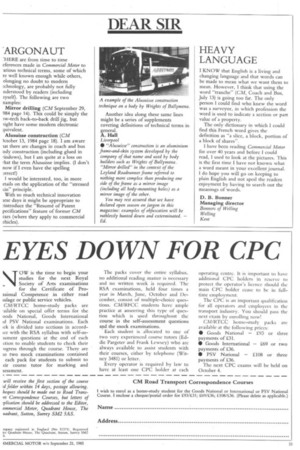DEAR SIR
Page 35

If you've noticed an error in this article please click here to report it so we can fix it.
'ARGONAUT
THERE are from time to time
eferences made in Commercial Motor to arious technical terms, some of which re well known enough while others, elonging no doubt to modern chnology, are probably not fully nderstood by readers (including lyself). The following are two
xamples:
Mirror drilling (CM September 29, 984 page 14). This could be simply the iw-tech back-to-back drill jig, but light have some modem electronic quivalent.
Alusuisse construction (CM )ctober 13, 1984 page 18). 1 am aware tat there are changes in coach and bus ody construction (including glued in rindows), but I am quite at a loss on rhat the term Alusuisse implies. (I don't now if I even have the spelling )rrect!)
I would be interested, too, in more etails on the application of the "stressed tin" principle.
With so much technical innovation iese days it might be appropriate to !introduce the "Resume of Patent pecifications" feature of former CM ears (where they apply to commercial ehicles).
Another idea along these same lines might be a series of supplements covering definitions of technical terms in general. A. Hall Liverpool
• "Alusuisse" construction is an aluminium frame-and-skin system developed by the company of that name and used by body builders such as Wrights of Ballymena. "Mirror drilled" in the context of the Leyland Roadrunner frame referred to nothing more complex than producing one side of the frame as a mirror image (including all body-mounting holes) as a mirror image of the other.
You may rest assured that we have declared open season on jargon in this magazine: examples of obfuscation will be ruthlessly hunted down and exterminated. — Ed.
HEAVY LANGUAGE
I KNOW that English is a living and changing language and that words can be made to mean what we want them to mean. However, I think that using the word "tranche" (CM, Coach and Bus, July 13) is going too far. The only person I could find who knew the word was a surveyor, in which profession the word is used to indicate a section or part value of a property.
The only dictionary in which I could find this French word gives the definition as "a slice, a block, portion of a block of shares".
I have been reading Commercial Motor for over 40 years and before I could read, I used to look at the pictures. This is the first time I have not known what a word meant in your excellent journal. I do hope you will go on keeping to plain English and not spoil the readers enjoyment by having to search out the meanings of words.
D. B. Bonner Managing director
Banners of Welling Welling Kent




































































































